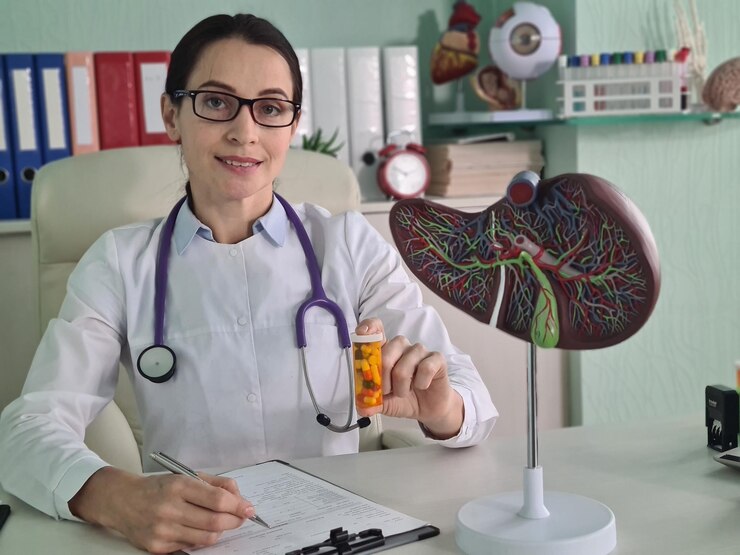Our kidneys are two bean-shaped, amazing organs tucked away in our lower back. But don’t let their size fool you! They play a vital role in keeping us healthy by filtering waste products, balancing fluids and electrolytes, and even producing hormones. When this filtration system gets disrupted, it leads to kidney disease.
This blog post aims to be your one-stop guide to understanding kidney disease, exploring treatment options, and learning how to manage the condition for a better quality of life.
Understanding Kidney Disease (Types and Causes)
Kidney disease can take many forms, each with its own cause. Here’s a breakdown of some common types:
- Chronic Kidney Disease (CKD): This is a gradual decline in kidney function. It often progresses slowly over time and has several causes, including diabetes, high blood pressure, and certain medications.
- Glomerulonephritis: This is an inflammation of the tiny filters within the kidneys. It can be caused by infections, autoimmune diseases, or certain medications.
- Polycystic Kidney Disease (PKD): This is a genetic disorder where cysts (fluid-filled sacs) develop in the kidneys, affecting their function.
- Urinary Tract Infections (UTIs): These are infections in the urinary system, including the bladder and kidneys. While usually treatable, recurrent UTIs can damage the kidneys if left untreated.
Risk factors for kidney disease include:
- Diabetes
- High blood pressure
- Family history of kidney disease
- Obesity
- Smoking
Recognizing the Signs and Symptoms of Kidney Disease
Early detection is crucial in managing kidney disease effectively. Here are some common signs and symptoms to watch out for:
- Frequent urination, especially at night
- Blood in the urine
- Foamy urine
- Fatigue and weakness
- Loss of appetite
- High blood pressure
- Puffiness around the eyes or swelling in the ankles and feet
- Difficulty concentrating
- Trouble sleeping
Remember: These symptoms can also be caused by other conditions. If you experience any of them, it’s important to consult a doctor for a proper diagnosis.
Treatment Options for Kidney Disease
The treatment for kidney disease depends on the specific type, severity, and underlying cause. Here’s an overview of some common approaches:
- Lifestyle changes: A healthy diet low in sodium, potassium, and phosphorus, regular exercise, and maintaining a healthy weight are crucial for managing kidney disease.
- Medications: Medications can help control blood pressure, lower blood sugar levels (in diabetes), and manage anemia, a common complication of kidney disease.
- Dialysis: When kidneys fail completely, dialysis is a lifesaving treatment that removes waste products and excess fluid from the blood.
- Kidney transplant: In some cases, a kidney transplant from a compatible donor can offer a long-term solution.
Real-life Example:
Imagine Maria, a 52-year-old diabetic. During a routine checkup, her doctor notices a slight rise in her blood creatinine levels, indicating potential kidney problems. Early diagnosis and lifestyle changes like managing her diabetes through diet and medication can significantly slow the progression of kidney disease and improve Maria’s overall health.
Managing Kidney Disease for a Better Life
Living with kidney disease requires commitment and lifestyle adjustments. Here are some tips for managing the condition and living well:
- Partner with your doctor: Regular checkups and open communication with your doctor are key to monitoring your kidney function and adjusting treatment plans as needed.
- Follow your treatment plan: Sticking to your medication schedule, dietary restrictions, and fluid intake recommendations is crucial for managing kidney disease effectively.
- Maintain a healthy lifestyle: Regular exercise, managing stress, and getting enough sleep all contribute to overall health and can benefit those with kidney disease.
- Join a support group: Connecting with others who understand the challenges of kidney disease can provide emotional support and valuable advice.
Remember: With proper management and a positive attitude, you can live a full and productive life even with kidney disease.
Conclusion
Kidney disease is a serious condition, but with early detection, proper treatment, and lifestyle changes, you can take control of your health and live well. Don’t hesitate to talk to your doctor if you have any concerns about your kidney health. By working together, you can create a personalized management plan to keep your kidneys functioning optimally and ensure a healthy future
